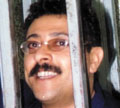
Year 2004 in review:A turbulent year in Yemen’s recent history [Archives:2005/811/Front Page]
January 27 2005
 |
 |
 |
The year 2004 had witnessed many significant incidents that will have long-term implications for many years to come. Most of those incidents resulted in negative consequences, causing frustration and disappointment for optimists who had thought that the post-2003 era would be brighter.
The two most dominant issues that gave the year 2004 its gloomy look are the rebellion of Sheikh Hussein Badreddin Al-Houthi in Sa'adah and the unprecedented legal battles waged by the government against the free press. Observers as the two that dominated the scene and would continue to be debated and speculated for years to come have marked the two issues.
A rebellion in Saadah
Yemen woke up with bizarre news on the eve of 19 June to find that the government announced officially the launch of a military assault against a 'rebel' leader named Hussein Badraddeen Al-Houthi. According to official sources at the time, the decision to launch the war was made after Al-Houthi refused to surrender to the authorities and killed three security men and declared his armed 'rebellion' against the state.
An 80-day conflict continued afterwards resulting in thousands of casualties with the number of dead still not confirmed and disputed until date. Independent confirmation of death was impossible due to restrictions imposed by the authorities. Nevertheless, the overall devastation to the area and to the government's budget was enormous. Thousands were seen fleeing their homes and thousands of army soldiers, civilians, and rebels were reported killed in independent and opposition media, while official media said that killed were in the hundreds.
The rebellion ended on September 10 when both the Ministries of Defense and Interior declared the death of Al-Houthi and the ending of his rebellion.
On 27 July, former judge of Haraz court was sentenced to 10-year imprisonment for supporting the rebellion. Along side, hundreds of youngsters from Sa'adah who were thought to have relations with Al-Houthi's movement were also arrested. A number of mosque preachers in Sana'a and other areas were apprehended as well for suspicion of their open support for Al-Houthi's ideas.
It is noteworthy mentioning that Al-Houthi was a prominent member of the parliament during 1990 and 1993. He was also seen close to the authorities upon the 1994 for his potential role in combating Wahhabi teachings in the north of Yemen.
An attack on the free press
Among other important features of 2004 was the unprecedented wave of legal attacks against the free press. The most important development was the sentencing of Al-Shoura newspaper's editor-in-chief Abdulkareem Al-Khaiwani to one year in prison and closing down his opposition newspaper for six months. The accusation was based on reports that 'promoted religions and ethnic hatred' and for 'defaming the person of the President, national unity, and national interest'. The articles published in Al-Shoura that were the cause of the sentence were written by other journalists, but for being the editor-in-chief and the ultimate person responsible in the newspaper, Al-Khaiwani was the only victim.
Al-Khaiwani was jailed and was unable to appeal his first instance court verdict. He was also beaten up and harassed in prison. The international community did little to ease his situation and no diplomatic or humanitarian agency took the time to visit him at jail unlike similar cases around the world.
This followed a series of other attacks against the press including the kidnapping of journalists Saeed Thabet of the Yemeni Journalists Syndicate (YJS) who was later tried and sentenced to a fine and prevention from writing for six months.
Thabet was accused of publishing a news item about an alleged assassination attempt against the President's elder son Ahmed Ali Abdullah Saleh.
In the same year, journalist Najeeb Yabili was reported kidnapped in Aden by the authorities, while Abduljabbar Saad was fired from his post in a governmental newspaper for writing in Al-Ihya Al-Arabi newspaper.
Furthermore, Al-Wasat newspaper's editor in Chief is still being tried for publishing articles that allegedly 'harm Yemen-Saudi relations'.
Eight newspaper journalists were also accused of charges similar to those of Al-Khaiwani, and their prosecution is still on. Among those still in courts are prominent political writer Abdullah Sallam Al-Hakimi, Abdulfattah Al-Hakimi and Lawyer Jamal Al-Jobi.
More recently, five newspaper editors were sentenced to suspended 6-month imprisonments. Those included Dr. Abdulrahman Abdullah, Abdulwahid Hawwash, editors in chief of Tajammu, Ihya Arabi respectively, writer Abduljabbar Saad. Journalist Nabeel Subai was sentenced to four months in prison, and editor-in-chief of Annas newspaper Hameed Shuhra got three months.
However, the most staggering sentence came in the last days of 2004 when Abdulkareem Sabra editor in chief and Al-Safi Abdulqawi Al-Qubati writer in Al-Hurriya Weekly both got two years imprisonment with hard labor. Both men are being chased and would be imprisoned immediately once they are arrested.
Economic troubles
The percentage of Yemenis living below the poverty line has increased significantly as more than 50% of the population is reported living on less than one US dollar a day. Meanwhile, prices of commodities also increased in an unprecedented rate reaching in some products up to 300%.
The year 2004 was a year of devastating unemployment as there were reports of a staggering 6 million young persons without work. Health and education standards also dropped for the public and the level of corruption increased according to the Transparency International, as Yemen's rank dropped compared to the year before.
Consequently, the middle class continued to shrink, as the two most dominant classes that are now prevailing are the rich and the poor.
2004 was also a year of anticipation as the public has been told repeatedly that the economic reform package would be revived and the subsidies for petroleum products would be lifted, which could trigger a hike of benzene prices by 50% and diesel prices by 100%.
Economists believe that such a step would inevitably result in at least a 500% increase in prices of many products, especially basic commodities.
Human rights abuses
Despite the inauguration of the year 2004 with an international conference on democracy, human rights in the capital Sana'a, the year witnessed an unprecedented level of human rights abused in the form of arrests of university students, kidnapping of citizens by the Police Security Office out of the rule of law and without solid evidence. Many of those incidents were reported by local and international nongovernmental organizations.
In Sana'a University, a number of highly qualified teachers had their rights confiscated and others who were associated with high-ranking officials were offered positions in the university without proper qualifications. A number of other violations also took place in the student unions' elections in the university.
However, most of the cases of prisoner abuse, torture, poor sanitary conditions of prisons continued without any corrective measures throughout 2004.
Trials and security
The year 2004 continued to witness ongoing trial sessions of defendants and suspects in the USS Cole and Limburg attacks. Each trial was done separately. However, no final verdicts were issued against the suspects.
The USS Cole verdict is expected to come out in February. This comes in a time Yemen continues to play an active role in anti-terrorism efforts. However, minor security incidents did take place in Yemen but not in the degree that was in earlier years.
However, the year 2004 witnessed a tangible increase in the number of criminal incidents that include murder, theft, drug trafficking, robbery, prostitution, etc.
The reported number of murder crimes committed in Yemen in 2004 was 258.
Meanwhile, the alarming rate of traffic accidents was also noticeable as almost 190,000 traffic accidents occurred throughout the country with the governorate of Sana'a leading with around 160,000-reported accidents.
——
[archive-e:811-v:13-y:2005-d:2005-01-27-p:front]


